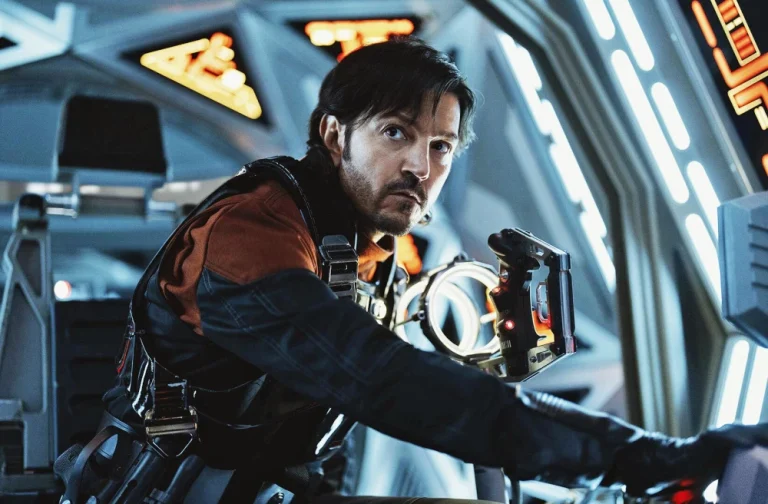Warning: This article contains spoilers for the series “Andor.”
Set in a galaxy far, far away, Andor’s second season might feel eerily close to home. The acclaimed Disney+ Star Wars series returns with new episodes that dive deeper into themes of authoritarianism, immigration, and resistance—sparking conversations about how fiction mirrors today’s political reality.
Season two, which premiered Tuesday on Disney+, picks up as the Empire’s grip tightens across the galaxy. Cassian Andor (Diego Luna), the thief-turned-rebel spy first introduced in Rogue One: A Star Wars Story (2016), continues his evolution into a resistance leader. After the events of season one—where unrest on his adopted home planet, Ferrix, began his radicalization—Cassian is now entrenched in rebellion as the Empire escalates its oppressive agenda.
The series, praised for its nuanced storytelling and political depth, has drawn comparisons to real-world struggles. Critics and fans alike have hailed Andor for not just echoing the themes of the original Star Wars but expanding them with striking modern relevance.
“This is George Lucas’s dream for Star Wars manifest in its purest form,” film critic Griffin Schiller wrote on X. “Anti-authoritarian art delivered through populist channels.”
Showrunner Tony Gilroy has been open about the historical influences behind the series. Speaking to Rotten Tomatoes, he explained that season two explores the broader machinery of revolution, including propaganda, media manipulation, planetary destruction, and internal factionalism.
“Every revolution you read about ends up with competing factions,” Gilroy said. “They all hate the same oppressor, but by the end, they’re fighting each other.”
That attention to political detail has resonated widely online, where many viewers see parallels between the show and the current U.S. climate—especially under the administration of former President Donald Trump, now serving his second term. “Genuinely insane how relevant these political issues in Andor are—and it was written before the current presidential administration came into power,” one X user noted.
Since its beginnings in 1977, Star Wars has dealt in themes of power, rebellion, and resistance. George Lucas himself described the franchise as anti-authoritarian, using his original films to critique everything from the Vietnam War to the Bush administration.
Still, not every spinoff has hit the mark with fans. Some have accused Disney of straying too far from the original trilogy or pushing modern political agendas. In response, Disney CEO Bob Iger has emphasized that the studio’s priority is to entertain—not to promote a specific ideology.
Yet Andor seems to have turned the tide of public opinion. Many now consider it one of the franchise’s most powerful and sophisticated entries.
The second season kicks off with Cassian stealing a prototype TIE fighter from an Empire base, aided by a sympathetic Imperial worker. When she expresses fear about joining the rebellion, he offers a stirring message:
“The Empire cannot win… You’ve become more than your fear. Let that protect you.”
Later, a chilling scene shows Imperial Director Orson Krennic (Ben Mendelsohn) leading a covert strategy meeting to subjugate the peaceful planet Ghorman—a sequence directly inspired by the 1942 Wannsee Conference, where Nazi officials planned the Holocaust. Gilroy confirmed the connection in an interview with The Hollywood Reporter, describing the scene as a deliberate parallel to that dark chapter of history.
Episode three continues the show’s hard-hitting themes, as Imperial forces search for “undocumented” workers lacking visas. The episode doesn’t shy away from the darker side of occupation, even portraying an attempted sexual assault on Bix Caleen (Adria Arjona), Cassian’s love interest, by an Imperial lieutenant.
“I know you’re illegal; we’ve been counting visas,” he tells her—implying that sex could buy her silence.
The series’ bold narrative choices haven’t gone unnoticed. Arjona told Variety that even though they filmed the scenes over a year ago, the themes remain starkly relevant.
“It’s just mirroring that we keep stumbling on the same rock,” she said. “It’s relevant now, and it’s going to be relevant in five, ten, twenty, fifty years.”
Online, fans have praised the show for addressing real-world issues with authenticity and urgency.
“Andor Ep1 already has leftist infighting and global supply chain issues. We love to see it,” one X user joked.
Another wrote, “The discussion about undocumented immigration and visas in those first three episodes… oh this show is touching on REAL topics.”
New episodes of Andor drop every Tuesday, with the season finale scheduled for May 13.

